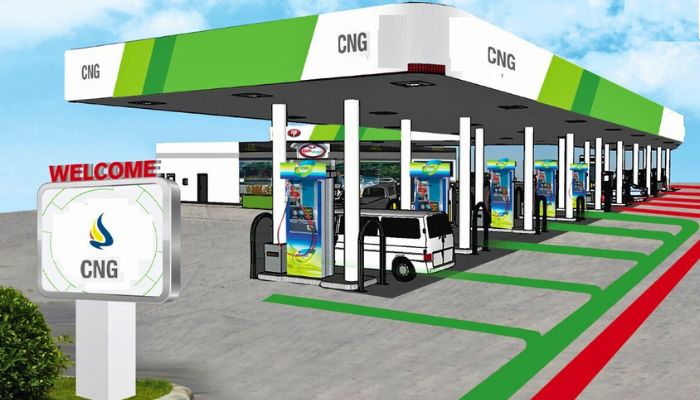On November 7, 2023, the Minister of Transport Sa’idu Alkali launched the newly introduced Compress Natural Gas, (CNG), vehicles as a fuel cost-cutting measure and to boost efficiency.
During the official commissioning and introduction of the vehicles to the Nigerian market at the CNG Conversion Station in the Nigerian Institute of Transport Technology, (NITT), in Abuja, the minister said the CNG can earn the federal government of Nigeria over 200 Billion from every one million cars converted.
He stated that his ministry has been having a series of conversations with relevant stakeholders and transport operators to get their buy-in into the conversion of vehicles to dual engines as a one-off expenditure due to the cost of energy.
Represented by an Assistant Director, Mrs Akhidenor Cynthia, Alkali said that the “CNG is mainly produced by composed methane, compressed to less than 1% of the volume it occupies at standard atmospheric pressure and It can be stored and distributed in hard containers at a pressure of 20-25 Megapascals, usually in cylindrical or spherical shapes.
He assured us that CNG is odorless, colourless, clear, non-corrosive, and non-toxic and is cheaper, cleaner, and available in Nigeria.
“The major consumption of fuel in the country is being borne by vehicles which have continued to increase in numbers. It is therefore believed that the cheaper and cleaner energy source is CNG.
On the benefits of CNG, he explained that it reduces air, noise, and Vehicular Exhaust Pollution (emission of carbon-monoxide), provides energy security, and better fuel efficiency.
He added that CNG cars have a longer lifespan compared to petrol cars due to the cleaner burning fuel and CNG-powered cars are safer and affordable.
In his welcome address, the Director General, NITT, Dr. Bayero Salih-Farah, stated that the event signifies a turning point in the history of transportation in the country, he commended the leadership of the presidential committee of the CNG for their effort toward the actualization of the initiative.
Dr. Salih-Farah informed us that NITT has provided their office to serve as a conversion center for all categories of vehicles to be converted to CNG.
Also at another forum the ground-breaking ceremony of Portland Gas in Lagos, Special Adviser on Energy to the President Olu Verheijen said the Federal Government is committed to ensuring there is sufficient gas in the country, saying it has put in place measures that would drive the compressed natural gas (CNG) project.
Represented by Eriye Onagoruwa, Verheijen said the signing dovetailed into the recently launched Presidential Compressed Natural Gas Initiative (P-CNGI), as part of the commitment to change the transportation landscape, reduce energy costs, stimulate economic growth, and foster a cleaner environment by reducing carbon emissions and promote energy security through domestic natural gas resources.
She said the Federal Government through the P-CNGI has joined forces with Portland Gas to forge a path towards a more environmentally conscious- and economically viable energy landscape.
Nigeria’s energy transition plans are crucial for addressing environmental concerns, meeting global climate targets, and ensuring energy security. Compressed Natural Gas, derived from natural gas, is emerging as a viable solution in this trajectory.
Overview of Nigeria’s Energy Transition Plans:
Nigeria, a country endowed with vast oil and gas resources, has long been dependent on fossil fuels for its energy needs. However, recognizing the need for diversification and environmental sustainability, the government has set ambitious targets to transition towards cleaner and more sustainable energy sources.
The National Energy Transition Strategy aims to increase the share of renewable energy in Nigeria’s energy mix, enhance energy efficiency, and reduce the environmental impact of traditional energy sources. Complementing this strategy, the adoption of Compressed Natural Gas is gaining momentum as a cleaner and more environmentally friendly alternative.
CNG as a Game-Changer
Compressed Natural Gas is natural gas compressed to a fraction of its volume at standard atmospheric pressure. It is a versatile energy source with applications in various sectors such as transportation, power generation, and industrial processes. In the context of Nigeria’s energy transition, CNG holds several advantages.
Reduced Emissions: One of the primary motivations for embracing CNG is its lower carbon footprint compared to traditional fossil fuels. Natural gas combustion produces fewer greenhouse gas emissions, contributing to Nigeria’s commitment to mitigating climate change.
Cost-Effectiveness: CNG is often more cost-effective than conventional fuels, providing an economic incentive for its adoption. As Nigeria seeks to balance energy sustainability with economic considerations, the affordability of CNG makes it an attractive choice.
Diversification of Energy Sources: CNG contributes to diversifying Nigeria’s energy mix, reducing the country’s reliance on a single source. This diversification enhances energy security and resilience against external shocks in the global energy market.
Transportation Revolution: The transportation sector is a significant contributor to Nigeria’s energy consumption and environmental challenges. The adoption of CNG-powered vehicles presents an opportunity for a transportation revolution. The government’s commitment to converting public transport fleets to CNG further reinforces this shift.
Infrastructure Development: The growth of CNG necessitates the development of infrastructure, including refueling stations and distribution networks. This infrastructure development contributes to job creation and economic growth, aligning with broader sustainable development goals.
Challenges and the Way Forward
While CNG offers promising prospects for Nigeria’s energy transformation, challenges must be addressed to ensure successful integration into the energy landscape.
Infrastructure Investment: Establishing an extensive CNG infrastructure requires significant investment. Public-private partnerships can play a pivotal role in mobilizing resources for the construction of refueling stations and distribution networks.
Awareness and Acceptance: Public awareness and acceptance of CNG need to be heightened. Educational campaigns and incentives for consumers and businesses can promote the benefits of CNG and encourage its adoption.
Policy Framework: A robust policy framework that supports CNG adoption is essential. Clear regulations, incentives, and long-term planning are crucial elements for the successful integration of CNG into Nigeria’s energy sector.
Compressed Natural Gas is emerging as a transformative force in Nigeria’s energy landscape, aligning with the country’s broader goals of sustainability and environmental responsibility.
As Nigeria progresses on its journey towards a diversified and cleaner energy mix, CNG stands out as a key player in shaping the nation’s energy future. The successful integration of CNG relies on collaborative efforts involving government initiatives, private sector participation, and public engagement to realize the full potential of this promising energy source.
By Dare Akogun








